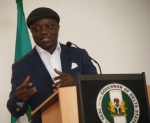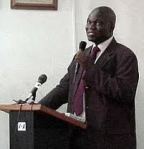 Delta state governor, Dr. Emmanuel Uduaghan has assured Deltans that he would not be biased in the distribution of the dividends of democracy to all the people irrespective of the pattern of voting in the last election.
Delta state governor, Dr. Emmanuel Uduaghan has assured Deltans that he would not be biased in the distribution of the dividends of democracy to all the people irrespective of the pattern of voting in the last election.
He promised to be fair to all and attend to issues dispassionately adding that it is time to sit down and govern the state. The elections are over, l am the governor of everyone, whether you voted for PDP or not.”
Uduaghan said, during his inauguration lecture titled “Ethnic Challenges and Development of the Niger/Delta”, that he will leave behind a united Delta state at the end of his four year tenure in office.
“I pray by the help of God that when l leave office in the next four years l will leave a more united Delta State where ethnicity is not in the fore front.”
A renowned journalist and Editorial member of Guardian Newspaper, Dr. Reuben Abati has advocated for an open and inclusive government to solve the issue of Ethnic challenges and Development in the country.
Delivering the lecture, renowned journalist and Editorial Board member of Guardian Newspaper, Dr. Reuben Abati advocated an open and inclusive government to solve the issue of Ethnic challenges and Development in the country. He explained that leaders should be open in their dealings with the people.
He noted that the government of participation would help control any form of deception, mischief and tribal sentiment which in most times lace the decisions that most leaders take in the governance of the people.
The guest lecturer, opined that when state resources were judiciously utilized for the benefit of the people there will be no tension, no crisis and mo militancy “ State resources should be well utilized and distributed equitably not to be managed by a selected few from selected ethnic group.”
He said for Peace, Justice and Equity to reign especially in the Niger/Delta region, there should be balance of attention on all ethnic groups whether core or non- core areas.
The erudite scholar called for the balance of political equation adding that leaders should govern a state with a greater percentage of lieutenants from all majority ethnic groups in the state.
Explaining the factors militating against the development of the Niger/ Delta region, the quest speaker said ethnic crisis, the issue of divide and rule and greed by traditional rulers have dealt fatal blow to the unity of purpose by both the elites and other leaders of the region.
Speaking further, he noted that the distribution of projects at state level must respect the right of non-oil producing communities to enhance development and avoid sowing the seed of discord among various ethnic groups.
“The integrity and efficiency of government needs to be improved, state governors in the region must resist the temptation of using vote pattern in the election as a measure for the distribution of development program in favour of those who supported them.”
He observed that the post amnesty program of the Federal government has drastically reduced militancy in the Niger/Delta region but expressed fear that the relief might be temporal unless there was genuine effort to develop the region.
Calling on Delta State governor not to use voting pattern in the last election to determine areas that would merit dividends of democracy Dr. Abati said there was no need to carry out any reprisal action.
He said development initiative should be geared towards the acceleration of infrastructural growth in all communities so that the state would move forward.
In his remarks the Chairman of the occasion Prof. B.I.C. Ijeoma regretted that the foundation for ethnic sentiments in the country was laid by our colonial masters.
He also regretted that our leaders in the first republic keyed into it and worsen the situation explaining that what the Niger/Delta region is experiencing was passed unto it by the political class.











